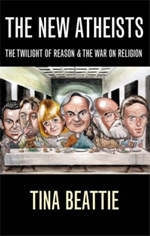 Becky Garrison recently e-mailed Tina Beattie, author of The New Atheists: The Twilight of Reason and the War on Religion,
Becky Garrison recently e-mailed Tina Beattie, author of The New Atheists: The Twilight of Reason and the War on Religion, to glean her insights on this ongoing debate.
Why is this new atheism primarily a British and American phenomenon?
Although the new atheists are sweeping in their condemnation of religion per se, they are by and large a rather homogenous bunch of disaffected white, male, English-speaking Protestants who seek in evolutionary science the kind of reassurances that perhaps they might once have sought in Christianity.
Sam Harris is Jewish.
Sam Harris is an exception. Not only does he come from a Jewish background, he is also a much more complex and clever philosopher with a smattering of mysticism and a neo-con approach to politics, which allows him to offer a quite terrifying philosophical justification for torture, war, and the inevitability of "collateral damage." Harris apart, most of the new atheists have much in common with their Christian fundamentalist counterparts.
How so?
They think that theirs is the one and only truth to which all other cultures and religions should submit; they interpret the Bible literally (they blindly condemn what religious fundamentalists blindly support); and they have very little insight into the psychological, philosophical, and historical complexities of their fellow human beings outside their own small circle. (Dawkins refers to French critical theorists as 'icons of haute francophonyism.') The new atheism reflects a certain intellectual zeitgeist currently fashionable in Britain and America (which are of course also two quite different cultures), rather than those of European cultures, which have been more deeply influenced by Catholic and Jewish thinkers, and where there is a greater concern for language and symbolism than science and fact in the construction of meaning. Continental atheism has its roots in philosophy and psychoanalysis rather than the material sciences (e.g. Nietzsche, Freud, Lacan), but it also arises out of the trauma of the 20th century and the Holocaust. I think it's fair to say that many Christian thinkers -- myself included -- have little difficulty reconciling Darwin's theory of natural selection with a Christian understanding of the world, but Auschwitz poses a much more fundamental challenge to the history and values of our faith. I would add that the new atheists fail to take seriously enough the challenge posed by the genocides of the 20th century to their own position, with its faith in science, progress, and reason. We should remember that, in the 20th century, a religious person was much more likely to be persecuted by an atheist than vice versa.
Why do you think you have more in common with Richard Dawkins than George W. Bush?
Well, for a start Dawkins has been fairly robust in his condemnation of the Iraq war, but I also agree with many of his criticisms about the dangers of religion -- not the least of those dangers is the alliance between recent American presidents and the Christian Right. (I have a friend who has a bumper sticker that says 'The Christian Right is neither'). My problem with Dawkins is not that he criticizes religious extremism, but that he is so undiscriminating and ill-informed in his criticisms. He blunts the impact of his own critique by spreading it too thinly and too wide. But if I had to choose between spending an evening with Dawkins or with Dubya, I'd choose Dawkins if only because I think the jokes would be better (the intentional ones, anyway).
[to be continued ...]
 Becky Garrison is the author of The New Atheist Crusaders and Their Unholy Grail
Becky Garrison is the author of The New Atheist Crusaders and Their Unholy Grail.
Got something to say about what you're reading? We value your feedback!